That turned out to be a good bit of Pi and a good turnout for both nights with people young and not-so-young converging from far and wide.
The NottingHack Raspberry Jam soon had a mini-Brambleweenie collection blinking their lights and displays. See below for a few pictures from the night. They will be continuing each first Tuesday of the month: Raspberry Jam Sessions
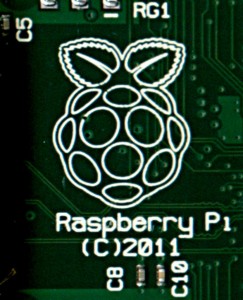 The following evening’s NLUG talk covered a little of the history leading up to the RasPi and there was good discussion for how the RasPi has become such a worldwide phenomenon. A surprising number of us in the group were up at before 6am one certain morning when the websites for Farnell (element14) and RS were soon overwhelmed! (And as of this posting, they are still overwhelmed by demand such that you must “register your interest” for just one RasPi per person to then order later as deliveries arrive.) There is already a series of mini-industries that have sprung up overnight producing cases and add-ons. The big question is how (well) the RasPi gets adopted by schools, teachers, and their pupils. Or might a RasPi home revolution itself be enough?
The following evening’s NLUG talk covered a little of the history leading up to the RasPi and there was good discussion for how the RasPi has become such a worldwide phenomenon. A surprising number of us in the group were up at before 6am one certain morning when the websites for Farnell (element14) and RS were soon overwhelmed! (And as of this posting, they are still overwhelmed by demand such that you must “register your interest” for just one RasPi per person to then order later as deliveries arrive.) There is already a series of mini-industries that have sprung up overnight producing cases and add-ons. The big question is how (well) the RasPi gets adopted by schools, teachers, and their pupils. Or might a RasPi home revolution itself be enough?
We saw the 8-bit home computer industry develop in the 1980’s, with a large driving force from computer games. That spawned the demoscene and the ARM developments. Those both have significantly shaped the games and computer world we now have today. Through the 1990’s, arguably we then drifted into a locked-down world of games consoles and very expensive PCs that stifled any opportunity for children at home to experiment or to learn the art of computing. In the world of proprietary restrictions, the older positive meaning of computer “hacking” to develop new code was instead transformed into the negative and unsavory meaning today that suggests the ‘illegal break-in’ of (proprietary locked-down) systems… Have we really made home computer development illegal?!…
This is where hopefully the freely open and charitable status of the RasPi can re-generate the art of home grown computer technology creativity and development.
Web links from my talk included:
- Eben’s talk from Hacker News London
- The MagPi magazine collaboratively produced by an independent group of Raspberry Pi enthusiasts
- And the RasPi blog: raspberrypi.org for all the latest details from the people behind the RasPi
- RasPi Software Distributions
- Beyond the BBC Micro
And as for The name ‘Raspberry Pi’: we wanted a fruit name for nostalgic reasons
; In the early days of Home Micros, there were a number of “Fruit” named computers. Apart from Apple, Apricot and Tangerine spring to mind
; and the Pi is from “Python interpreter” that is adopted as the ‘official’ language for the Raspberry Pi.
To finish with a well known phrase from a well known figure who uses the old very positive meaning from the early days of computer development:
Happy hacking!
Or… Rather should that be that this is a new beginning? I’m sure we’ll be hearing and seeing more of this 😉
Cheers,
Martin
From the Nottinghack evening: Raspberry Jam – Raspberry Pi User Group BEGINS!
More pictures of the Nottinghack evening can be found on:
- Nottinghack: Raspberry Jam at Nottingham Hackspace
- FishPi: Raspberry Jam @ Nottingham Hackspace 3rd July 2012

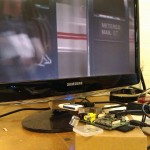
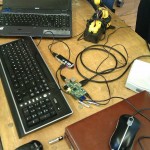
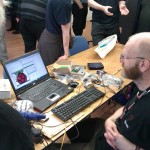
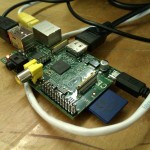

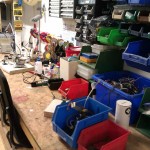
The RasPi people have hit the news again in various ways!
BBC: Cash prizes to reward young Pi programmers
Summer programming contest!
Summer Code Contest poster
Nominet Outstanding Contribution to the UK Internet Award: We won!
And a few other bits:
DIY expansion board from Mike Cook
Preorder the Raspberry Pi User Guide
Shame about the not-so-freedom formats for that particular publisher (as noted in the forums for that link). For those more sensitive on such details, there’s the excellently developing MagPi volunteers magazine!
For a recent trio of uplifting ( 😉 ) articles:
* Raspberry Pi used as flight computer aboard black-sky balloon
(Edit: In quick succession, also blogged on the RasPi site: Pi in the sky, and on the BBC: Sky high success for Raspberry Pi computer)
* Raspberry Pi sales limits lifted
* Overview: Adafruit Pi Cobbler Breakout Kit for Raspberry Pi
The RasPi takes off yet further?… 🙂
Meanwhile for some more down to earth local Nottinghack Raspberry cooking and Arduino mixing:
Raspberry Pi Arduino Buffer
Arduino Rotary Encoder Menu System
Some good fun high-flying stuff 😉
A couple of ‘hiccups’ in the RasPi design have come to light… Perhaps not critical but also perhaps something that might affect reliable operation:
Fixing 1.8V power rail design error
Much further detail over on the element14 forums:
RG1 1.8v regulator
Including some beautiful thermal imaging to highlight one of the effects:
RG1 1.8v regulator – thermal images
There is also:
Expert opinion needed on Raspberry Pi power issue
A related power issue is:
Power over USB
Still good, but something to be aware of. Here’s waiting to see how the opinions and fixes progress…
The various RasPi ‘foibles’ threads are running somewhat long, usefully so but also sometimes heatedly so. I guess the Human heat is all part of the pent up enthusiasm and assumed hype surrounding the RasPi…
For my own one example of an early-ish RasPi, I’d noticed all along the very occasional stutter or character repeats on the keyboard, usually more noticeable if the RasPi was busy running some application. Only a very minor occasional hiccup. However… In the recent warm weather, the keyboard stammer has on more often occasions become irksome and the LAN connection has been unusably unreliable. Sure enough, the USB/LAN chip was too hot to touch. All would be fine again after a cool-down until some condition or temperature threshold is again tipped over 🙁
Can’t wait for cooler weather, so looks like I’ll be getting out my soldering iron and magnifying glass! Can’t really trust operation with a known circuit board fault for the 1v8 rail that should be two separate rails.
Here’s hoping that for most users, the 1v8 fault proves not to be of concern. Quite possibly, if “RG1” happens to consistently take the load rather than the USB/LAN chip dedicated internal circuit, there is no problem to notice.
Meanwhile, the issue of reliable USB and LAN operation is confused by the reliability of the obfuscated proprietary drivers being used, a lack of documentation for what those drivers should be doing exactly and how, and a long software delay for SD card I/O that may be causing USB critical interrupts to be lost…
So… (Possibly) Minor mods to the current boards, a swift PCB re-spin for the masses, or use a Model B (no USB LAN chip, so no irksome 1v8 connections), a fix of the USB drivers and… Everyone’s happy oncemore! 🙂
The RasPi certainly works ‘well enough’. However, I wonder if the easily available Linux distros have boosted expectations beyond what the current level of RasPi development can readily support. I’ll admit I’ve had my early hopes of running a 2 Watts LAN server slightly dampened for the moment 😐
Still all very good for what was only intended as a prototype… So we’ve found some bugs! Still all excellent stuff.
The real problem is going to be how perceptions are managed and massaged… I hope there’s not too much adverse press about this. A good fix is needed quickly…
Tooms has made an excellent investigation into the power and running temperatures for the RasPi components on his blog: The power of the Raspberry PI
His experiments and measurements for running the RasPi with and without the wiring fault for the 1v8 rail show at most a mere 5 °C temperature increase to 60 °C for the USB/LAN chip powering the 1v8 rail (and 28 °C ambient?). That suggests that the package temperature shouldn’t be a problem. However, the chip junction temperature could well be creeping over the limit if the parts are only meant to operate for the commercial grade temperature range of 0 °C to 70 °C.
Hence adding a heatsink to the USB/LAN chip may well be the obvious and easy fix.
That leaves whether there might be a problem with electrical noise on the 1v8 line between the ARM SoC and the USB/LAN chip, and/or whether the unreliability seen is actually software/driver problems…
For further investigation.
(An interesting power aside: Tooms measured the RasPi total max power at 2.3 W, of which the chips consumed less than 0.6 W with the 1v8 rail corrected. The rest of the power is lost as heat by the low dropout linear voltage regulators. Tooms is next looking to replace them with switch-mode regulators that can offer 90+% efficiency… Watch his blog!)
He subsequently acquired a revision 2 Raspberry Pi Model B and has rerun his tests: Follow up 1 – The power of the Raspberry PI
Quite a different power usage and heat distribution for the revision 2, all for the better! He also notes the heat buildup seen when the RasPi is enclosed in a case:
A few more bits and RasPi-eces: 🙂
There is a list of Raspberry Jams locations on: RaspberryJam Locations
A cute retro RasPi clock: An NTP driven Nixie Clock. An interesting aspect is the interfacing with the RasPi to convert NTP (internet world atomic time) to a 4800 baud, 8N1 NMEA serial (time) signal…
In addition to Farnell/element14 and RS, there is now Maplin with their Raspberry Pi and Starter Kit
For those wanting VGA video from their RasPI, there is for one example: Amazon seller BestDealUK – HDMI Input To VGA Adapter Converter
A Wiki is being kept of what works and what doesn’t work with the RasPi: RPi Verified Peripherals
And Eben Upton, now world famous for the RasPi, gains the MIT Technology Review’s TR35
Are we seeing the early days of a new ‘Linus Torvalds’ or ‘Richard Stallman’ for promoting unencumbered Free/Libre IT teaching via the RasPi?
For yet more of a feast of Raspberry Pi, you can now buy from:
They are now even being made in the UK!
Raspberry Pi production back in Blighty
Factory pictures from South Wales
The technical side of the story of how the Raspberry Pi group made it to South Wales is given by Pete Lomas on WIRED:
Raspberry Pi’s Secret: ‘Sell Out a Little to Sell a Lot’
Quite a story and quite a continuing impact. One unmissable quote: “… our small, part-time only team was faced with a success disaster…”.